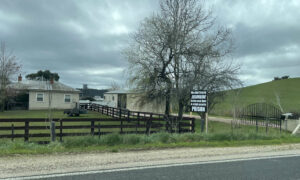PAUL OOSTING
The move by Gunns to begin landclearing for the pulp mill is a charade designed to further fuel community conflict and create the illusion that its pulp mill project is still on track, according to the Wilderness Society. Gunns has announced pipeline construction plans on a publicly owned reserve, despite not having Federal Government approval to operate the mill, the necessary agreements from local council and landowners, and funding for the mill.
“The pulp mill is not a real project. It lacks funding, full government approvals and legal access to land,” said Paul Oosting, pulp mill campaigner for the Wilderness Society. “We will not be drawn into Gunns’ charade but will continue to work with the community to protect and create jobs in high-growth areas such as tourism, farming, fishing and plantations.
“Gunns’ board and management are playing games with investors’ money at the expense of the Tasmanian people. We are calling on Australians to get active and lobby their superannuation funds to make sure they don’t allow this irresponsible behaviour to continue,” said Mr Oosting.
“This is what we expected from Gunns, knocking down vegetation to try and create the charade the mill is going ahead. It is a cynical move designed to fool the public and investors into believing the pulp mill is going ahead,” continued Mr Oosting.
“This deliberately divisive action by Gunns shows their complete disregard for the people of Tasmania and those working in the Tamar Valley in existing jobs in fishing, farming and tourism.”
Swedish pulp company Södra, the company widely speculated to be considering a joint venture partnership with Gunns, has set pre-conditions which would require Gunns to go back to the drawing board.
“This move by Gunns also displays a total disregard for the views and co-management requirements of any potential joint venture partner.
“The Wilderness Society will continue talks with Södra to inform them of this pre-emptive construction by Gunns and ensure that if a pulp mill is built in Tasmania it meets basic environmental, social and economic standards.
“Tasmania needs projects which will increase people’s prosperity on a sustainable basis, not environmentally and socially destructive projects like the pulp mill which will cost more jobs than it will create,” concluded Mr. Oosting.



























Dave Groves
August 2, 2009 at 23:25
wot 4 blokes and a shovel???
john hayward
August 3, 2009 at 00:21
The crucial player in the Gunns strategy is a state government rotten beyond belief. Why would this government be backing a project which no reputable analyst has ever endorsed?
Again: Stop, Thief !
John Hayward
Mike Adams
August 3, 2009 at 12:40
Virtually a full page spread in the Ex of August 4th, with photos.
‘To the east the power lines of the East Tamar Highway, to the north, the new Tamar Power Station, to the west the Tamar River and to the south Gunns existing woodchip facility.’
There’s a lot more to the east, west, south and north. But that wasn’t mentioned.
Grant Stevens
August 3, 2009 at 13:51
At the moment West Tamar Council publicly say the State Solicitor General’s advice regarding council having any say over Gunns’ access to council controlled land, is wrong. But after the October council elections, maybe the balance of power will shift and the council will move away from accepting what Riverside resident, Gunns’ lawyer Shaun McElwaine has advised council, that the council cannot stop Gunns from building the pipeline on council-controlled land. Council can at any later stage choose to take action against Gunns if they decide (Gunns’ lawyer) McElwaine is wrong and Solicitor General Leigh Sealy is right. Would you want to invest in a project on such shaky ground particularly considering how likely West Tamar Council electors are to be fuming if the pulp mill goes ahead. There might even be some
changes to councillorships mid-election term. One can’t rule out what residents might do if they feel their homes, families and livelihoods are threatened.
Tony Saddington
August 3, 2009 at 14:19
Today’s Mercury. http://www.themercury.com.au/article/2009/08/04/88695_tasmania-news.html
Gunns CEO, Greg L’Estrange stated that Gunns have no JV partner or finance. No announcement to the ASX .
I would imagine that this ‘window dressing’ is more to do with boosting confidence in the company in order to obtain Timbercorp assets.
If it was a serious attempt to clear land, you would not employ one man on a slasher.
D1
August 3, 2009 at 14:38
If TWS think it is a charade and the project has got bucklies chance of getting up, then why do they feel inclined to issue a media release, or even run an expensive campaign to stop it ? I’m not sure that they are fully convinced by their own propoganda.
Richard Butler
August 3, 2009 at 14:42
Perhaps Lawyers for Forests can explore opportunities to take out injunctions against the contractors.
Gerry Mander
August 3, 2009 at 21:45
Bartlett’s ‘line in the sand’ specifies substantial work must have started on the pulp mill by 30th August if it is to qualify for any state funding.
Does ‘turning a sod’ qualify as substantial work?
The Examiner seems to think so, otherwise it wouldn’t be making such a big issue out of it.
It is also a strange co-incidence that Meander Valley Council, where the feeder dam is, and West Tamar Council where the pipeline starts are both advised by Gunns solicitor, Mr Shaun McElwaine.
How do you spell efficks?
William Boeder
August 3, 2009 at 23:12
The amount of pernicious purpose that has and is still quite apparent in the company of Gunns Ltd, should see them delisted from the ASX.
I note that a certain long term director is bailing out or has been asked asked to walk the plank.
Much will be announced in tomorrow’s AGE news business section, on the track record of said director!
pilko
August 4, 2009 at 00:20
If in the unlikely event West Tamar Council fail to stand up to Gunns and protect ratepayers land as the state government and ratepayers have directed them to, they will have to face some very serious questions from ratepayers. The WTC has received a legal opinion from a lawyer who also represents Gunns that because of PMAA, the Council planning and other laws are put aside/ superseded by the State PMAA.
This is highly contested not only by the state government but by other lawyers. Of course, the WTC in respect of its own land has the same rights as landowners on the East Tamar, who are refusing Gunns’ pipeline access. Only the state government can compulsory acquire WTC-owned land, just as the state govt is the only agency that can compulsorily acquire any private citizen’s land. The state are not attempting to do this.
Mr Easther will of course not forget that he put a “vote of no confidence” in the Governments “fast track Pulp Mill assessment” as expressed in law through the PMAA. Therefore the WTC has a social contract with WTC electors which it must take seriously. Indeed, WTC ratepayers now maintain an expectation that rather than the council rolling over and helping to facilitate the construction of the pulp mill, council would be consistent with its position and the wishes of ratepayers and continue to oppose the progress of the fast track pulp mill.
The West Tamar coucnil are under no compulsion from anyone or any law to hand over this land. For at least two years now Gunns have attempted to perusuade East Tamar Land Owners into signing over their land for Gunns easement. Thus far most of these landowners have refused Gunns. How much more then should a council who has the majority of rate-payers in support stand up and not be rushed and coerced into signing their land over to Gunns?
Who will the West Tamar council heed. The ratepayers, the solicitor general and treasurer or Gunns and their lawyers? Unless we are living in some kind of bizarre fascist throwback state there is only one sane choice.
joey
August 4, 2009 at 00:43
D1, if you think that gunns are actually starting construction why do you feel the need to make a (another?) bogus email address and criticise TWS? the answer to your question is not difficult to arrive at. if this is a charade (which it appears to be) then it is in TWS’s interest to alert people to this, duh….
Pete Godfrey
August 4, 2009 at 00:44
Looking at the pictures in the Examiner it appears that all that is happening is that they are clearing out scrub under the power lines.
First question
Do they have a forest practices plan for this clearing?
Second question
Again why only one man and a slasher not a team of bulldozers?
Third Question
Why are they talking about beginning clearing on a public reserve (Trevallyn Reserve) who gave permission for a private company to clear a public reserve?
Fourth question
Why are they clearing land for the water pipeline when they do not have permission for the pipe to cross much of the land on the route?
I smell a rodent!
Richard Butler
August 4, 2009 at 02:39
Oh yes (on injunctions) – that mob who at last check seemed to be happy to help Gunns out in the reserve – the FOTD/ FOTR or whatever. Them too.
Anyone helping Gunns in the repair of environmental damage caused by them or their contractors needs to be really sure of who they are helping, and why.
Gunns remains happy with the removal of rights of Tamar Valley and other residents (via PMAA Section 11). Contributors to Gunns projects need to hold a mirror up and ask the question as to which side of the Trevallyn Dam they really sit on. The Gunns side, or the right side.
The word ‘principle’ comes to mind… and it seems strangely absent.
ron
August 4, 2009 at 03:14
Alright….I’ll take the bait.
In answer to you question D1, the reason for the continued TWS interest is that they understand the pulp mill project is, much like a zombie in a George Romero horror film, only rendered harmless when it is flat on the ground and no longer twitching.
As for the clearing program, I really don’t think the one man and his slasher/dozer (and his dog spot?) is a serious gesture on the part of Gunns. I mean if Tony Burke is right we have 1 down and 7,999 to go…however if the ratio of 1:1 Examiner articles to gainfully employed locals holds then Fiona Reynolds may need to consider taking on some new staff to cope with the overflow.
From where I stand it looks more like a very hollow gesture aimed at ensuring that KPMG can continue to quarrantine the $120-130 million debt accrued on this farce thus far. I assume it will also make a nice bullet point headline in the annual report and allow Gay to wax-bullshit-lyrical about “project ready” status come the AGM.
On a final point, does anyone else notice that when you get some kind of positive comment made about the Lindsay Street boys the poster is invariably anonymous, new and incapable of spelling….it’s propAganda D1…if someone attempted to effect propOganda on me, I doubt if I would be convinced either.
Dave
August 5, 2009 at 01:02
Guys, basically you seem in part to have missed the point of the excercise. There is only one real reason Gunns have commenced some basic clearing of land, and that is to try to ensure they don’t loose their Land Use Planning Permits from the 3 relevant Councils.
A planning permit is granted on the basis amongst a huge range of other matters on the proviso that the developer commences Substantial Development of the project within 2 years from the permits being granted. If they fail to do this, the permits lapse and the whole permit approval process has to re-commence from the start.
Now I don’t expect that the George Town Council would have any issue in finding some reason to say that Gunns have commenced development but as I understand it things are not quite so straight forward with the two other Councils. Hence the urgency for some demonstration of action. Whether or not these Councils accept this as Substantive Development is another thing.
Oh and by the way Pete #12, they don’t actually require a FPP, since the level of clearance is only related to ground clearance of shrubs and is less than 100ha. I think this is correct, perhaps someone might know better than me about this.
I can’t comment on the rest of your questions since I don’t know the answers but I would suspect they are permitted to clear on land they have permission to do so, irrespective of whether or not they have all the necessary approvals for the entire proposed pipeline route. As I am sure any of you would be aware the pipeline route has had to be changed given that not all land owners have conceded to Gunns wishes. Therein lays yet another part of the problem for Gunns.
Steve
August 5, 2009 at 02:10
15; I’m no expert on FPP but from my limited experience with it, any clearing over 1 ha which involves plants with the potential to grow to more than 5m requires a plan. Sounds insane but I don’t think I’m too far off!
Pete Godfrey
August 5, 2009 at 02:16
Dave post#15 good point on the land use issues. You may have hit the nail there!
On the forest practices plans a forest practices plan is necessary for any clearing over a hectare in any one year or for the taking of over 100 tonnes per annum of firewood. It is also necessary in the event that any threatened species of vegetation is present.
There is the possibility that there are threatened vegetation communities on the site, and there was mention of the larger trees being chipped in the newspaper article. There must also be consultation with the relevant local government authorities unless the land has been declared a Private Timber Reserve. Which the pulp mill site could not be as a PTR would prevent the construction of the pulp mill on the site.
There is also the distinct possibility of endangered species of burrowing crayfish (engaeus spp.) being on site as well.
All in all they must have an FPP and it would have to have canvassed the possible threatened species and geological issues.
Dave
August 5, 2009 at 16:42
Cheers Pete, good to have that clarification, as I indicated I wasn’t clear on the actual level of land to be cleared that would trigger the necessity for a FPP.
I was aware of issues such as rare and threatened species that also is relevant in triggering the requirement for a FPP but as far as the pipeline route (and should have mentioned this too, but basically forgot to). I have no idea if such species are present or not, but would have thought that they would have had to report on this matter already ???
Re the planning issues, well I guess it probably will come down to how much pressure may be brought to bear on the other two Councils to agree with Gunns that they have met their obligations in terms of Substantial Commencement to allow the permit to remain in force. That I guess is yet another issue to have to contend with. But the sceptic within me suspects they may get their own way.